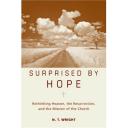Here is a good article on Acts 17 and how we should understand the issue of worldview and how our worldview needs to be explained in big picture form to give people a proper understanding of the Bible when we evangelize them.
Here is an excerpt:
This is a complaint we often hear and part of me wants to sympathize with it. It is crucial that we learn the gospel and proclaim it. But it is also vitally important to understand that the people to whom we speak bring with them their own particular prejudices, backgrounds and biases. The way we go about communicating the gospel will need to vary depending on the audience.
Of course the gospel is the power of God for salvation, and evangelism is a spiritual activity. People are blinded by sin and it is the Holy Spirit who compels belief. However, if the example of Paul is anything to go by, we must address the cultural presuppositions of our hearers so that we do not unwittingly obscure the gospel.
Paul’s speech to the Athenians in Acts 17:22-31 is the longest sermon recorded in the New Testament where a Christian is evangelizing people who do not have any knowledge of the Bible. (Compare this with Paul’s sermon in Pisidian Antioch in Acts 13 where he is evangelizing people who are familiar with Judaism.) In Athens, he is dealing with people who have never heard of Moses, never read the Old Testament, and are clearly polytheists. They had a different worldview.
Today, in the West, we are in a similar situation. Increasingly, we are dealing with people who are biblically illiterate and hold a modernist or postmodern worldview (or perhaps a combination of both). Up until fairly recently we could presuppose that 80 to 95 per cent of our hearers had a Judeo-Christian worldview, or at least were informed by it. Accordingly, if we were dealing with an atheist we were dealing with a ‘Christian atheist’ in the sense that the type of God this atheist disbelieved in was the Christian God. Accordingly, in evangelism one could explain the significance of the death and resurrection of Jesus and the need for repentance and it would be fairly well understood.
But that is not the case today. In addressing a generation significantly informed by postmodern thinking there are two main lessons (clearly illustrated in Acts 17) that we need to keep in mind: (1) We need to confront the postmodern worldview with the big story of the Bible; and (2) We need to know where we are going in our evangelism – that is, to a point where people grasp that we are sinful before a holy God and need to be forgiven. (more…)


